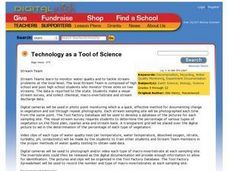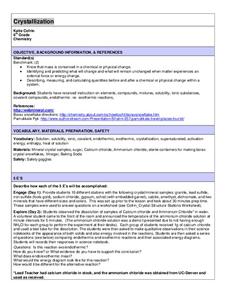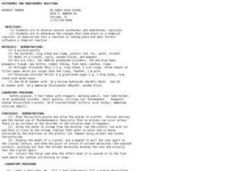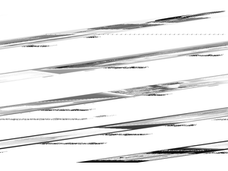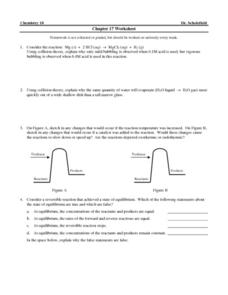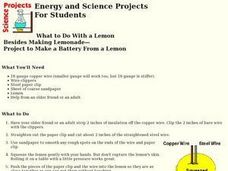Cornell University
Forensic Science: Case of the Missing Diamond Maker
Someone stole a diamond-making machine. Who done it? Scholars use forensic science at six different stations to determine the culprit. They analyze fingerprints, use their senses, and complete chemistry experiments to determine the...
CCEA
Home Economics: Teen Building
Learners explore the emotional and nutritional needs of teenagers in a six-lesson unit, which covers such topics as food sources, cooking skills, emotional well-being, and the positive effect of food and family occasions.
Government of South Australia
Don't Waste Your Energy
Don't lift another finger, this physical and environmental science unit has everything you need to begin teaching your class about energy. Starting with a look at the greenhouse effect, these lessons and activities take young scientists...
American Chemical Society
Density: Sink and Float for Solids
Steal cubes sink, but steal ships float. Lesson explores the density of solids as well as the density of water in determining what will sink and what will float. A hands-on group activity helps pupils see that weight and volume are two...
National Library of Medicine
Your Environment, Your Health: Air Quality
Some scientists argue that air pollution now causes more deaths than smoking. The second unit in a six-part series focuses on air quality. Scholars learn what's in the air, how clean the air around their school is, and what they can do...
Science 4 Inquiry
Enzymes in Action
Enzymes play a role in almost every function in the human body. Scholars explore three variables related to the use of enzymes. They observe a catalase reaction, experiment with substrates, and examine reactions rates.
Curated OER
Technology as a Tool of Science
Students monitor streams, take stream surveys, collect chemical and macro-invertebrate and stream discharge data. Using a digital camera, students observe the percentage of various types of vegetation on the flood plan, riparian area and...
Curated OER
Energy from Hydrocarbons
In this energy from hydrocarbons worksheet, students read about endothermic and exothermic reactions and how hydrocarbons release heat as fuels. Students read how to measure heat changes in reactions and practice finding the specific...
Curated OER
Diffusion
Students investigate diffusion using different solutions of chemicals placed in agar dishes. In this diffusion lesson plan, students observe 3 demonstrations of diffusion using perfume, food coloring in water and sugar cubes in water....
Curated OER
Water Cycle
Ninth graders explore ways water moves through various reservoirs on Earth, examine how human activities change water cycle, investigate substances present in water that indicate human activity, and discuss how understanding water cycle...
Curated OER
Cool Chemistry- DIY pH Indicator
Students study the differences between an acid and a base. In this pH lesson students view a demonstration then test chemicals in groups.
Curated OER
Crystallization
Eighth graders analyze physical change in mass. In this chemistry lesson, 8th graders describe, measure and calculate the amount of physical change occurring in mass before and after the change. Students should be familiar with elements,...
Curated OER
Crazy Chemistry Lesson Plan
Students study water molecules, cohesion and surface tension. In this molecule cohesion lesson students create chemical reactions that cause a balloon to inflate and another one that results in soap suds.
Curated OER
Exothermic and Endothermic Reactions
Students observe demonstrations of exothermic and endothermic reactions and determine the changes that take place in a chemical reaction. Students observe four demonstrations showing entropy, attraction of molecules due to polarity,...
Curated OER
The Tell-Tale Plume
High schoolers examine hydrothermal vents. In this ocean instructional activity, students identify changes in physical and chemical properties of sea water caused by hydrothermal vents.
Curated OER
Activit #2 Matter: Is It Conserved?
Students support the law of conservation of matter with evidence. They discuss the changes observed from the burning of the candle, and the differences in mass which are observed when the same reaction is carried out in an open or...
Curated OER
Balancing Equations Online
In this balancing equations worksheet, learners use an on line source to answer questions about balanced equations and they write balanced equations for various types of reactions. They balance equations using an on line game that allows...
Curated OER
The Speed of Chemistry
In this rates of chemical reactions worksheet, students read about the various factors that influence the rate of chemical reactions such as surface area, concentration, temperature and catalysts. Students answer eight questions about...
Curated OER
The Solar System
Third graders investigate Newton's law of Motion. In this chemical reaction lesson, 3rd graders participate in an experiment with rockets to study Newton's law. Students observe the effects of a chemical reaction made by combining...
Curated OER
Experiment on Measuring Reaction Rates
High schoolers investigate the rate of a chemical reaction. In this rate of reactions lesson plan, students use an electronic balance to measure the change in mass of a chemical reaction between hydrochloric acid and calcium carbonate....
Curated OER
Chapter 17 Worksheet- Equilibrium
For this equilibrium worksheet, students answer eleven questions about chemical reactions, equilibrium concentrations and endothermic and exothermic reactions. They write equilibrium expressions for chemical reactions and they explain...
Curated OER
Bog Science
Learners study bogs. They tour, collect physical, chemical, and biological data and analyze a pristine bog community. Using the data, they draw a map and a cross section of the bog.
Curated OER
The Effects of Alcohol and other Teratogens: A model using Zebrafish
Students investigate the interference of various drugs on an embryo through experimentation. This is an open-ended lab to allow students to see effects of various chemicals humans choose to put in their bodies and create questions they...
Curated OER
Make a Battery From a Lemon
Fifth graders construct a voltaic battery. They change chemical energy into electrical energy by inserting copper wire into a lemon. They discover the tingle of the wire on their tongue is due to the movement of electrons.
Other popular searches
- Physical and Chemical Changes
- Chemical Changes in Matter
- Physical Chemical Changes
- Chemical Changes in Rocks
- Chemical Changes Rust
- Matter Chemical Changes
- Chemical Changes Indicators
- What Are Chemical Changes
- Rates of Chemical Changes
- Chemical Changes Rusting
- Chemical Changes of Matter
- Physical/chemical Changes








